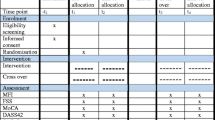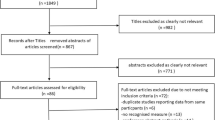Abstract
Post-stroke fatigue (PSF) is a common symptom after stroke and interferes with the rehabilitation. There are limited pharmacological therapies for managing PSF. Astragalus membranaceus (Huangqi) is a frequently used Chinese herbal medicine (CHM) in the treatment of fatigue in China. The aim of this review was to summarize the efficacy of adjuvant therapy with CHM Huangqi (CHM-HQ) in managing fatigue after stroke. We searched the databases in both English and Chinese for randomized controlled trials (RCTs) on CHM-HQ for PSF till November 2016. The Cochrane risk of bias tool was used to assess the quality of included trials, and the Review Manager 5.3 software was used to conduct the data analysis. Sixteen RCTs with a total of 1222 participants were included. The evidence was poor in quality with unclear or high risks of bias. Compared to routine intervention, treatment with CHM-HQ decreased the fatigue severity based on the assessment of the Fatigue Severity Scale, Fugl-Meyer and Visual Analogue Scale, and improved the quality of life as measured by the Stroke Specific Quality of Life scale, the Barthel index, and the modified Barthel index, while the adverse effects were mild. In conclusions, adjuvant therapy with CHM-HQ may benefit in managing fatigue and quality of life in stroke patients. However, stronger evidence is needed for a promising conclusion and more rigorous designs of RCTs are merited in the future.










Similar content being viewed by others
References
Acciarresi M, Bogousslavsky J, Paciaroni M (2014) Post-stroke fatigue: epidemiology, clinical characteristics and treatment. Eur Neurol 72:255–261
Chaudhuri A, Behan PO (2000) Fatigue and basal ganglia. J Neurol Sci 179:34–42
Chaudhuri A, Behan PO (2004) Fatigue in neurological disorders. Lancet. 363:978–988
Chen HJ, Shen YC, Shiao YJ, Liou KT, Hsu WH, Hsieh PH et al (2015) Multiplex brain proteomic analysis revealed the molecular therapeutic effects of buyang huanwu decoction on cerebral ischemic stroke mice. PLoS One 10:e0140823
Choi-Kwon S, Kim JS (2011) Poststroke fatigue: an emerging, critical issue in stroke medicine. Int J Stroke 6:328–336
Choi-Kwon S, Choi J, Kwon SU, Kang DW, Kim JS (2007) Fluoxetine is not effective in the treatment of post-stroke fatigue: A double-blind, placebo-controlled study. Cerebrovasc Dis (Basel, Switzerland) 23:103–108
Cumming TB, Packer M, Kramer SF, English C (2016) The prevalence of fatigue after stroke: a systematic review and meta-analysis. Int J Stroke 11:968–977
De Groot MH, Phillips SJ, Eskes GA (2003) Fatigue associated with stroke and other neurologic conditions: implications for stroke rehabilitation. Arch Phys Med Rehabil 84:1714–1720
Denzler K, Moore J, Harrington H, Morrill K, Huynh T, Jacobs B et al (2016) Characterization of the physiological response following in vivo administration of astragalus membranaceus. Ecam, Evidence-based complementary and alternative medicine, p 6861078
Ding XF, Liu Y, Yan ZY, Li XJ, Ma QY, Jin ZY, et al. (2017) Involvement of normalized glial fibrillary acidic protein expression in the hippocampi in antidepressant-like effects of xiaoyaosan on chronically stressed mice. Evidence-based complementary and alternative medicine : eCAM:1960584
Feigin VL, Krishnamurthi RV, Parmar P, Norrving B, Mensah GA, Bennett DA et al (2015) Update on the global burden of ischemic and hemorrhagic stroke in 1990-2013: the gbd 2013 study. Neuroepidemiology 45:161–176
Feng L, Sima ZF, He LY, Wu YF, Niu YB, Ping RX et al (2014) Effects of buzhong yiqi and rehabilitation training on post-stroke fatigue. Chin J Phys Med Rehabil 36:421–424
Glader EL, Stegmayr B, Asplund K (2002) Poststroke fatigue: a 2-year follow-up study of stroke patients in Sweden. Stroke. 33:1327–1333
Guo XX (2015) Effects of qi-tonifying dominated chinese medication plus rehabilitation on the quality of life of ischemic post-stroke fatigue patients of qi deficiency syndrome. Yixue lilun yu shijian 28:3200–3201
Guo YH, Chen HX, Xie RM (2012a) Effects of qi-supplementing dominated chinese materia medica combined with rehabilitation training on the quality of life of ischemic post-stroke fatigue patients of qi deficiency syndrome. Zhongguo Zhong xi yi jie he za zhi Zhongguo Zhongxiyi jiehe zazhi = Chinese journal of integrated traditional and Western medicine 32:160–163
Guo YH, Chen HX, Xie RM, Ou HN, Yang ZJ, Wang ZF (2012b) Effects of qi-supplementing dominated chinese materia medica combined with rehabilitation training on the quality of life of ischemic post-stroke fatigue patients of qi deficiency syndrome. Chin J Integ Tradit West Med 32:160–163
Hinkle JL, Becker KJ, Kim JS, Choi-Kwon S, Saban KL, McNair N et al (2017) Poststroke fatigue: emerging evidence and approaches to management: a scientific statement for healthcare professionals from the american heart association. Stroke. 48:e159–e170
Ingles JL, Eskes GA, Phillips SJ (1999) Fatigue after stroke. Arch Phys Med Rehabil 80:173–178
Jiang HH, Guo YM, Deng YH, Zhou AX, Jiang WL, Zheng JY et al (2012) Clinical observation on integrated chinese and western medicine treatment of post-stroke fatigue. Chin Arch Tradit Chin Med 30:1830–1832
Karaiskos D, Tzavellas E, Spengos K, Vassilopoulou S, Paparrigopoulos T (2012) Duloxetine versus citalopram and sertraline in the treatment of poststroke depression, anxiety, and fatigue. J Neuropsychiatry Clin Neurosci 24:349–353
Krishnamurthi RV, Feigin VL, Forouzanfar MH, Mensah GA, Connor M, Bennett DA et al (2013) Global and regional burden of first-ever ischaemic and haemorrhagic stroke during 1990–2010: Findings from the global burden of disease study 2010. Lancet Glob Health 1:e259–e281
Li XY (2012) Clinical research on traditional chinese medicine in the treatment of poststroke fatigue
Li WY, Liu YL, Yuan WJ, Xiao WM (2013) Rehabilition effect observation of fatigue after stroke of 32 patients. China Med Pharm 3:51–52
Liang HY, Lan P, Liang HZ, Hu ZH, Tan KW (2013) Effect of yulang xiaopi decoction on post stroke fatigue: a clinical observation of 60 cases. Guid J Tradit Chin Med Pharm 19:30–32
Liang YH, Gong WJ, Su Y, Li CJ (2016) Effects of buyang huanwu decoction plus xiaoyao san on post stroke fatigue. People's Mil Surg 59:169–170
Liu CH, Tsai CH, Li TC, Yang YW, Huang WS, Lu MK et al (2016) Effects of the traditional chinese herb astragalus membranaceus in patients with poststroke fatigue: a double-blind, randomized, controlled preliminary study. J Ethnopharmacol 20:20
Luo L, Deng S, Yi J, Zhou S, She Y, Liu B. (2017) Buyang huanwu decoction ameliorates poststroke depression via promoting neurotrophic pathway mediated neuroprotection and neurogenesis. Evidence-based complementary and alternative medicine : eCAM.2017:4072658
Michael K (2002) Fatigue and stroke. Rehabil Nurs 27:89–94 103
Niu YB, Feng L, Ru WY (2013) Effects of xiaopiling granule on post stroke fatigue: a clinical observation of 30 cases. Zhejiang J Tradit Chin Med 48:924–925
Ouyang M, Liu Y, Tan W, Xiao Y, Yu K, Sun X et al (2014) Bu-zhong-yi-qi pill alleviate the chemotherapy-related fatigue in 4 t1 murine breast cancer model. BMC complementary and alternative medicine 14:497
Ponchel A, Bombois S, Bordet R, Henon H.( 2015 ) Factors associated with poststroke fatigue: a systematic review. Stroke research and treatment.:347920
Poulsen MB, Damgaard B, Zerahn B, Overgaard K, Rasmussen RS (2015) Modafinil may alleviate poststroke fatigue: a randomized, placebo-controlled, double-blinded trial. Stroke 46:3470–3477
Schepers VP, Visser-Meily AM, Ketelaar M, Lindeman E (2006) Poststroke fatigue: course and its relation to personal and stroke-related factors. Arch Phys Med Rehabil 87:184–188
Song XJ. (2011) Effeet of the combination of jiawei buyanghuanwu decoction and rehabilitation training on the serum proinflammatory eytokines in patients with post stroke fatigue
Steiger N, Cifu AS.( 2016) Primary prevention of stroke. JAMA.;316
Tan Y (2014) Clinical observation on treating fatigue following stroke with yulang xiaopi decoction. Clin J Chin Med 6:119–120
Ulrichsen KM, Kaufmann T, Dorum ES, Kolskar KK, Richard G, Alnaes D et al (2016) Clinical utility of mindfulness training in the treatment of fatigue after stroke, traumatic brain injury and multiple sclerosis: a systematic literature review and meta-analysis. Front Psychol 7:912
Wang MH, Yang AM, Ai QL, Hu LY.(2015) Clinical observation on post stroke fatigue treated by recuperate Gan and pi therapy. Chin J Integr Med Cardio-/Cerebrovasc Dis 13:1930–1931,1932
Wu S, Kutlubaev MA, Chun HY, Cowey E, Pollock A, Macleod MR et al (2015) Interventions for post-stroke fatigue. Cochrane Database Syst Rev 7:CD007030
Yang ZJ. (2008) A clinical study on treating cerebral ischemic stroke with movement functional problems with combination of rehabilitation and buyang huanwu decoction
Zhao HJ. (2015) Clinical research on zhong feng shen qi tong luo soiuble granuless in the treatment of poststroke fatigue on the recovery of schemic apoplexy with qi deficiency and blood stasis
Zou LY. (2014) Clinical effect of combining peiyuan huanwu decotion with rehabilitation training and the influence on the serum proinflammatory cytokines in patients with post-stroke fatigue
Acknowledgements
This work was supported by grants from the National Natural Science Foundation of China (81703901 to XQH and 81773717 to HTZ), Key research and development project of shandong province (2019GSF108069). The Shandong Province Natural Science Foundation of China (No:ZR2016HB56), Shandong Medical and Health Science and Technology Development Plan (No:2015WS0103), Development Project of traditional Chinese Medicine Science and Technology in Shandong Province (No:2015-249), Science and Technology Program of Colleges and Universities in Shandong Province (No:J14LM52).
Author information
Authors and Affiliations
Corresponding authors
Ethics declarations
Conflict of interest
The authors declare that there is no conflict of interest.
Additional information
Publisher’s note
Springer Nature remains neutral with regard to jurisdictional claims in published maps and institutional affiliations.
Rights and permissions
About this article
Cite this article
Xu, L., Xu, XY., Hou, XQ. et al. Adjuvant therapy with Astragalus membranaceus for post-stroke fatigue: a systematic review. Metab Brain Dis 35, 83–93 (2020). https://doi.org/10.1007/s11011-019-00483-4
Received:
Accepted:
Published:
Issue Date:
DOI: https://doi.org/10.1007/s11011-019-00483-4




